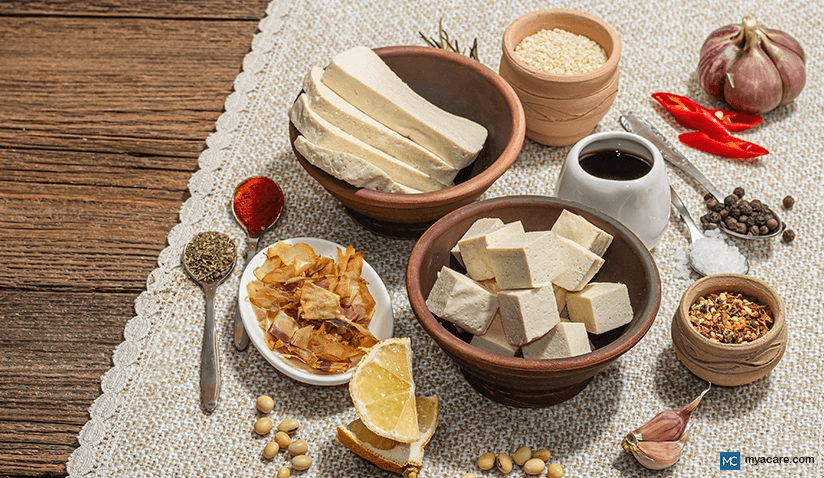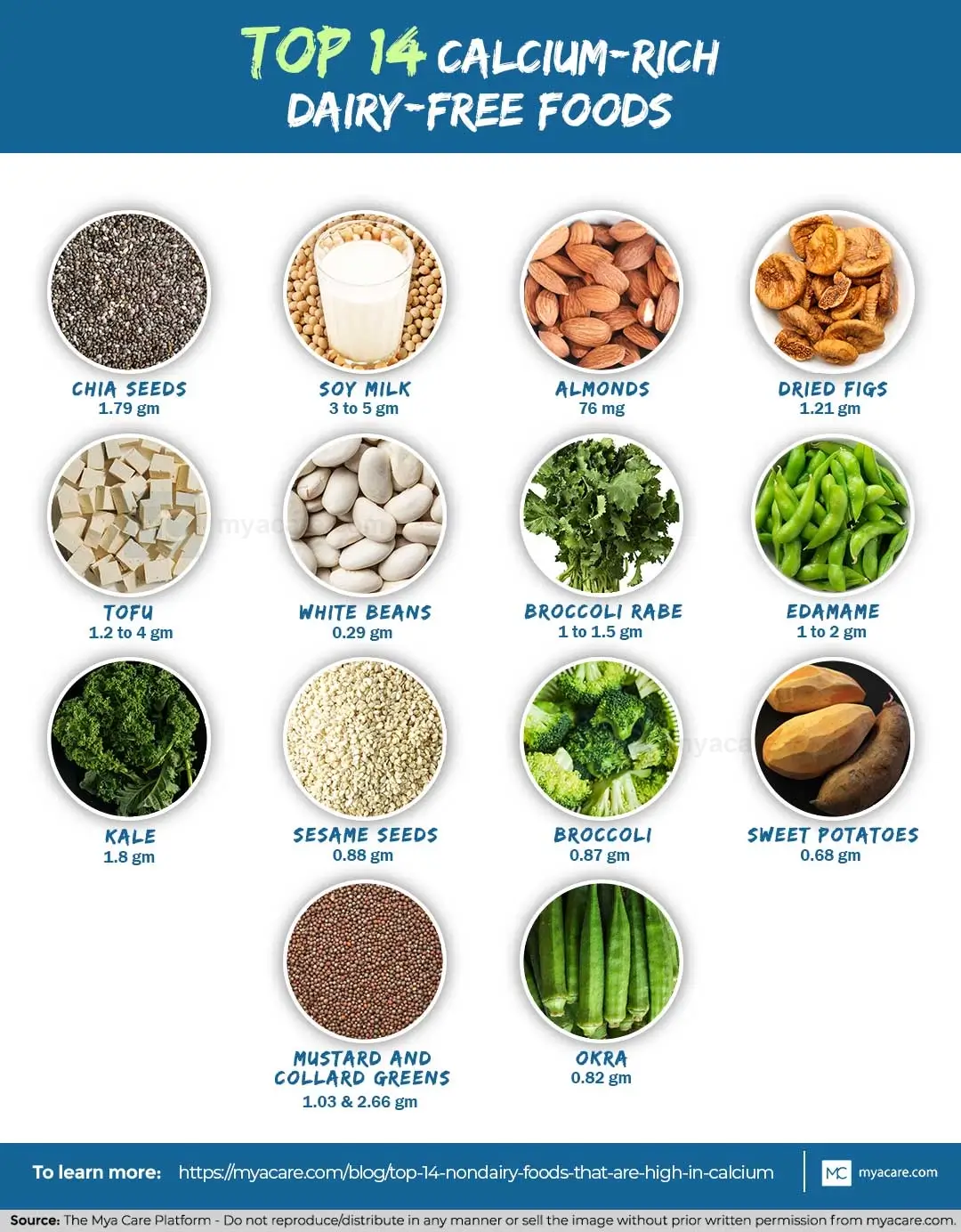Top 14 Non-Dairy Foods That Are High in Calcium

Medically Reviewed and Updated by Dr. Sony Sherpa, (MBBS) - January 30, 2024
Calcium is essential for supporting various biological processes and maintaining strong bones and teeth. Calcium was traditionally associated with dairy products. However, numerous non-dairy alternatives are equally rich in this essential nutrient. It is beneficial to obtain vitamins and minerals from natural sources through food and drink. These non-dairy foods high in calcium provide nutritious substitutes that can help meet daily calcium needs.
The daily recommended calcium intake for adults is one gram. You can consume a variety of widely accessible non-dairy foods to get this recommended dosage in case you are lactose intolerant, vegan, allergic to dairy, or just want to diversify your calcium sources.
This article will discuss the top 14 non-dairy foods that are rich in calcium. These calcium-rich non-dairy foods can help maintain an optimal calcium level without relying solely on dairy products.
Top 14 Calcium-Rich Dairy Free Foods
Following are a few calcium-rich foods that do not contain animal-based products:
1. Chia Seeds
Chia seeds are a popular superfood and a great source of calcium. The source of these tiny seeds is the Salvia hispanica plant, which is indigenous to Central and South America. Chia seeds are well known for their omega-3 fatty acids and fiber, but they also contain calcium, which makes them a vital supplement to any diet.
Chia seeds contain vitamins and minerals essential for bone health, including phosphorus and magnesium. Two tablespoons or a single ounce of chia seeds give about 18 percent of the recommended amount of calcium, about 1.79 grams. This is the amount the body needs for nerve functioning, muscle, and healthy bones. Chia seeds offer more calcium in grams than several dairy products.
2. Soy milk
Soy milk is a non-dairy beverage that is mostly valued for its high calcium content. It is a plant-based milk substitute made from soybeans and is an ideal option for those who have dairy allergies, lactose intolerance or are vegan. Soy milk is packed with nutrients, with calcium being its main ingredient. It is also a great option for people with specific dietary requirements.
Soy milk is enriched with calcium to ensure it offers similar or even higher calcium levels than many dairy foods. Enriched soy milk contains about 3 to 5 grams of calcium per serving. This value makes up a significant percentage of the recommended daily calcium consumption. Because of this, soy milk is an excellent source of calcium for protecting the bones and supporting different biological processes in the human body.
3. Almonds
Almonds are a wholesome and versatile dairy-free food. They are also a great source of calcium. One ounce of almonds contains roughly 76 milligrams of calcium. While not having the highest calcium content when compared to other foods, they still provide a considerable amount of plant-based sources of calcium. If you want to increase your calcium intake, almonds are a good non-dairy and healthy alternative. Including almond milk in your diet can support your general bone health as well as fulfill your daily calcium requirements. Additionally, they can be used to create vegan ice cream.
4. Dried figs
A delicious and sweet snack, dried figs provide a dairy-free, organic source of calcium. They are a great way to satisfy your sweet craving while ensuring that you get the necessary daily dose of calcium. Dried figs have a high amount of calcium content, which makes them stand out from many other non-dairy foods. Half a cup of dried figs provides about 1.21 grams of calcium, making it the best choice for meeting your calcium needs.
5. Tofu
Tofu is a common plant-based protein and is also an excellent source of calcium. It is a versatile food made from soybeans. Besides its ability to absorb flavor and texture, it is also known for its fantastic nutritional benefits. It provides a non-dairy option for people seeking to boost their calcium consumption while relishing a plant-based meal.
When tofu is produced with calcium salt in the coagulation process, it offers a fantastic source of calcium. A half-cup serving of tofu provides about 1.2 to 4 grams of calcium. However, this is dependent on the preparation method and brand.
6. White beans
White beans like navy beans or cannellini beans and other varieties are a fantastic source of calcium. They offer a versatile and nutritious option for people who need a non-dairy source of calcium. Besides being a good source of calcium, white beans also have numerous health benefits.
A cup of cooked white beans offers about 0. 29 grams of calcium.
7. Broccoli Rabe
Broccoli rabe, also known as rapini, belongs to the family Brassica and provides a series of health benefits, including calcium. Adding broccoli rabe to your diet can help increase calcium intake while offering you other essential nutrients.
According to research, a serving of cooked broccoli rabe has about 1 to 1.5 grams of calcium. However, this depends on the cooking methods and the specific preparation. So, consuming broccoli rabe is a good choice if you follow a lactose-free or plant-based diet.
8. Edamame
Edamame is a soybean that is harvested before it matures. Edamame is a versatile green pod offering a nutritious and tasty option for boosting calcium intake, therefore, adding edamame to your meal plan will significantly increase your calcium level and other health benefits.
Studies show that a cooked cup of edamame offers about 1 to 2 grams of calcium, depending on the cooking method and specific preparation. Besides the calcium content of edamame, they are also an abundant source of plant-based protein. It contains all the twenty amino acids the body needs, making it a great source of protein. Edamame also provides vitamin K, folate, dietary fiber, and essential nutrients.
9. Kale
Two cups of raw chopped kale contain about 1.8 grams of calcium. Kale is a cruciferous vegetable with several antioxidants that help delay or prevent cell damage. Like many other plant-based foods that are rich in calcium, kale also contains compounds like oxalates. These compounds disturb the absorption of calcium. It is advised that you cook your kale properly before consumption to decrease the oxalate content. To enjoy the fantastic nutritional benefits of kale, steam it as a side dish or chop it into a salad.
10. Sesame seeds
Sesame seeds are tiny, packed with nutrients, and popularly known for their fantastic calcium content, making them an excellent choice for a calcium-rich diet. A tablespoon of sesame seeds contains about 0.88 grams of calcium.
Besides their high calcium content, sesame seeds also offer several essential nutrients. They are rich in healthy fats, especially polyunsaturated and monounsaturated fats, which are essential for heart health. Sesame seeds also provide minerals, vitamins, proteins, fibers, and antioxidants like sesamin and vitamin E, which have been linked to several health benefits.
11. Broccoli
A cup of frozen broccoli contains about 0.87 grams of calcium. The National Cancer Institute USA said that a meal rich in broccoli and different members of the cruciferous family has been connected to reducing the risk of cancer. Research on rodents also suggests that broccoli's constituents can help prevent stomach, liver, colon, breast, and bladder cancer. However, they are yet to get desirable results in humans.
12. Sweet Potatoes
Sweet potatoes are generally high in calcium, containing about 0.68 grams per large sweet potato. They are also highly nutritious, provide other essential nutrients and are a good source of vitamins C and A, antioxidants, and dietary fiber. These essential nutrients are vital in promoting resistance to the effects of aging, preventing cancer, and promoting eyesight. However, note that sweet potatoes are low in fats. They are commonly used as side dishes in different parts of the world.
13. Mustard and Collard Greens
Mustard and collard greens are green vegetables that provide several health benefits. A cup of cooked collard greens has about 2.66 grams of calcium, while a cup of cooked mustard greens contains 1.03 grams of calcium. This amount is essential to meeting your daily calcium requirements, making collard and mustard greens an excellent option for people looking for non-dairy sources of calcium.
14. Okra
Okra is a nutrient-dense vegetable that has a number of health benefits.It is a non-dairy food that has a high amount of calcium. A cup of okra has about 0.82 grams of calcium.
Okra also provides several essential nutrients that are needed for a balanced diet. It is a good source of vitamin C , antioxidants, folate, and dietary fiber. Okra is also known for its abundance of magnesium and potassium, which are essential for the body's well-being. Many people enjoy okra roasted, boiled, pickled, or fried.
It is important to remember that calcium absorption is influenced by other elements of your diet, such as the presence of phytates and oxalates. These elements are found in whole legumes, leafy greens, whole grains, and other plant-based foods. These elements can combine with calcium and slow down its absorption.

Conclusion
The need for adequate calcium intake without having to rely on dairy products has led to the discovery of many non-dairy foods with high calcium content. From nutrient-dense seeds to fortified alternatives like plant-based milk (such as coconut milk), and leafy greens like bok choy and kale a wide variety of accessible and nutritious options are available for those who want to maintain their bones and general health.
Adding these 14 non-dairy calcium-boosting foods into your diet ensures that you can efficiently adapt to an inclusive and diverse diet satisfying your calcium needs. Whether you are lactose intolerant, follow a vegan lifestyle or wish to expand your culinary skill, or, these calcium-rich dairy-free foods provide various health benefits like reduced risk of Osteoporosis and improved muscle function.
To search for the best Dietitian/Nutritionists in Croatia, Germany, India, Malaysia, Slovakia, Spain, Thailand, Turkey, the UAE, the UK and The USA, please use the Mya Care search engine.
To search for the best healthcare providers worldwide, please use the Mya Care search engine.
The Mya Care Editorial Team comprises medical doctors and qualified professionals with a background in healthcare, dedicated to delivering trustworthy, evidence-based health content.
Our team draws on authoritative sources, including systematic reviews published in top-tier medical journals, the latest academic and professional books by renowned experts, and official guidelines from authoritative global health organizations. This rigorous process ensures every article reflects current medical standards and is regularly updated to include the latest healthcare insights.

Dr. Sony Sherpa completed her MBBS at Guangzhou Medical University, China. She is a resident doctor, researcher, and medical writer who believes in the importance of accessible, quality healthcare for everyone. Her work in the healthcare field is focused on improving the well-being of individuals and communities, ensuring they receive the necessary care and support for a healthy and fulfilling life.
References:
Featured Blogs



